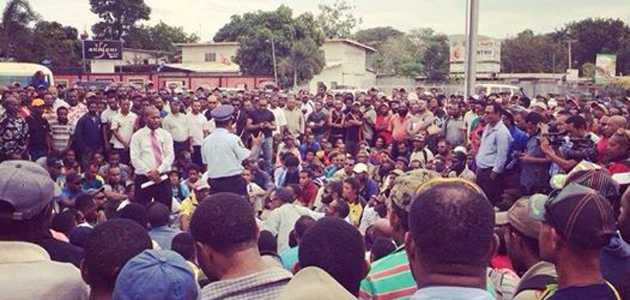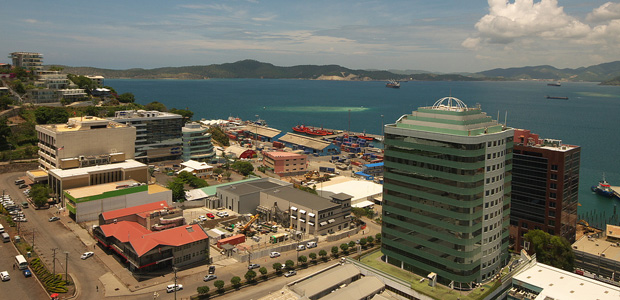
Crowds demonstrating against Papua New Guinea’s prime minister, who is currently facing corruption charges. Image: Elvina Ogil
Politics in Papua New Guinea (PNG) – an island state with 850 languages, three official languages for administration and 7 million people – are complicated at the best of times and extremely tempestuous at the moment.
The Prime Minister Peter O’Neill is facing corruption charges and is working under the threat of an arrest warrant. The head of the body that instituted the investigation has been fired and reinstated all within the last month.
On July 17 the National Fraud and Anti-Corruption Directorate filed contempt charges against the chief of police for failing to arrest the prime minister. The charges relate to the role he is alleged to have played in securing illegal payments for a high-profile lawyer, Paul Paraka.
The outcome of this gripping saga is critical for the future governance of the country and its international relations, both political and business.
The rule of law must be upheld and due process followed to prove that institutions are above the personalities in power. This will restore the confidence of the people and of companies considering investment in our hugely resource-rich country.
But this is a tough ask for a young democracy where 80 per cent of the population live on subsistence farming, education is far from universal, maternal mortality rates scandalous, criminal violence a scourge and corruption rampant.
When O’Neill took office in 2012 he promised to crack down on the corruption that has crippled the economy and devastated the country’s main export business: natural resources. PNG is ranked 144 out of 177 countries in the 2013 Transparency International Corruption Perceptions Index, scoring just 25 out of 100, indicating a serious problem with corruption.
It will take more than words to address this and the community needs to be one of the drivers of change.
Answers for a way forward
Civil society can act as a positive force in helping to resolve this political crisis and forge a way forward in Papua New Guinea. At Transparency International Papua New Guinea we have stressed the need to raise awareness about the role of institutions and to change the perception that the theft of public assets is wrong.
We do this by trying to educate young people of their responsibilities in a democracy and their role in holding the powerful to account. Earlier this month, 57 people aged 18 to 22 years took part in the Mike Manning Democracy camp. We have recently completed another training programme for teachers, developing civic education materials for schools; and we play an ongoing role in the Youth Against Corruption Association, which is active in many schools.
Unfortunately, too many sections of the community believe that those in power have a right to receive some of the spoils of the state. There is a tendency to accept corruption on the basis that the community expectations of “big men” include the need for them to appropriate state funds to meet customary obligations.
This is a deliberate misrepresentation of traditional practice and modern institutions. The banking system and trading businesses flounder when people apply this excuse for theft.
Although it is customary for visitors to communities to bring some form of gift for their hosts, it is not customary for this to be applied to visiting service providers or officials. Nurses are not, for example, expected to provide gifts to the community in order for them to be permitted to do their work.
In this present crisis, we have contacted various public officials reminding them of our concerns, our focus on improved government and our willingness to be of assistance.
Failure to respond
A major problem in PNG is the failure of official organisations to respond to evidence of corruption. For example, in 2009 there was a detailed report looking into corruption in the Department of Finance, but little was done to follow up on the information publicly available and hold the corrupt to account.
This lack of action weakens the rule of law and makes it harder to show the next generation that corruption does not pay. That is why the rule of law needs to take its course in the current corruption crisis.
Efforts to supress the results of inquiries, sack officials with unsubstantiated claims of political collusions, to refuse to answer legitimate questions and then delay legal procedures create the perception that individual office holders see themselves as being exempted from the laws.
The Prime Minister has often eloquently explained the importance of weeding out official corruption wherever it exists and is now challenged to lead by example. For the good of the country, he cannot be seen to be above the law.
Carousel Image: Copyright, Elvina Ogil.
















 Connect with us on Facebook
Connect with us on Facebook Follow us on Twitter
Follow us on Twitter